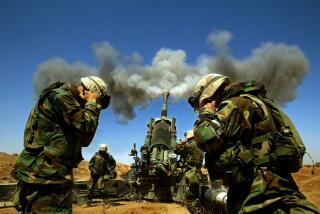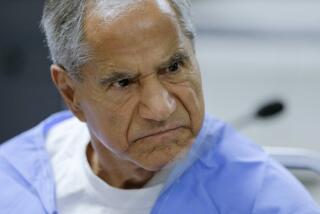Revoke Hussein’s ‘Probation’
- Share via
We should harbor no illusions about Saddam Hussein’s determined belief that weapons of mass destruction will demonstrate his preeminence over the Middle East.
And we should recognize that his particular weapons fetish poses the kinds of credible “downside risks” that make action not only imperative but lawful.
Consider a scenario in which the United States’ next national emergency call comes after another year of political dithering about the Hussein regime. One day, after we have slipped back into the routines of ordinary peacetime life, a small package is delivered to the U.S. mission at the United Nations. Inside is a videotape that depicts each stage of fabrication of a crude nuclear weapon and shows the finished product placed in an anonymous office, apartment or truck trailer somewhere in the U.S.
Accompanying the tape are blueprints and engineering specifications verifying the bomb’s functionality, along with a list of demands from an Al Qaeda-like group. Among the demands is the directive that the U.S. must “end the starvation of the Iraqi children” by immediately terminating all sanctions, “no-fly” zones and blockades of Iraq and by withdrawing all U.S. forces from the Persian Gulf. The “delivery system” for this doomsday device is one of the 98% of cargo containers that arrive without scrutiny each day in U.S. ports, rather than a mode traceable to its source.
Suppose the device goes off, having been placed in the favorite target city--New York, say, next to the New York Stock Exchange. The explosion, of “tactical nuclear” proportions, kills or maims tens of thousands of people and renders a large area around the country’s financial nerve center uninhabitable.
Then comes the economic fallout, and there is no shelter. When trading resumes with a jury-rigged infrastructure, the U.S. experiences economic panic and crash. Markets hate uncertainty, and they react violently to the paramount uncertainty of where and when the next mushroom cloud will sprout.
The troubling question is not whether this scenario is realistic or far-fetched. It is whether there can be any magnitude of evidence of Hussein’s intentions and capabilities that would satisfy those critics in the international community who complain that the U.S. has failed to justify military action to oust him.
The nations of the Gulf War coalition already are at war with Iraq and have been for these last dozen years, at varying levels of intensity.
When we deploy combat aircraft to enforce no-fly zones over a sovereign nation, we are engaging in a species of blockade that is quintessentially an act of war. Should an F-16 pilot enforcing the no-fly zones be required to radio for U.N. Security Council approval before he fires on an Iraqi radar station “locking on” to target his aircraft?
Iraq in this situation is like a criminal who mugs elderly people to get money for his drug habit. The criminal is convicted of armed robbery and put on probation. One of the conditions is that he submit to random drug testing. When he refuses the drug tests, he should not have to be caught red-handed committing a new crime before his probation is revoked.
There is ample justification under international law for an invasion of Iraq, even without reference to the Bush administration’s new doctrine of preemptive self-defense, which could be dangerous in the wrong hands.
We need not only “regime change” as a policy goal but “regime trial” for the institutional war criminals of the Iraqi leadership. Such trials would serve as an object lesson and deterrent to leaders of the new “axis of evil,” as well as afford justice to the thousands of Hussein’s victims.
More to Read
Sign up for Essential California
The most important California stories and recommendations in your inbox every morning.
You may occasionally receive promotional content from the Los Angeles Times.










